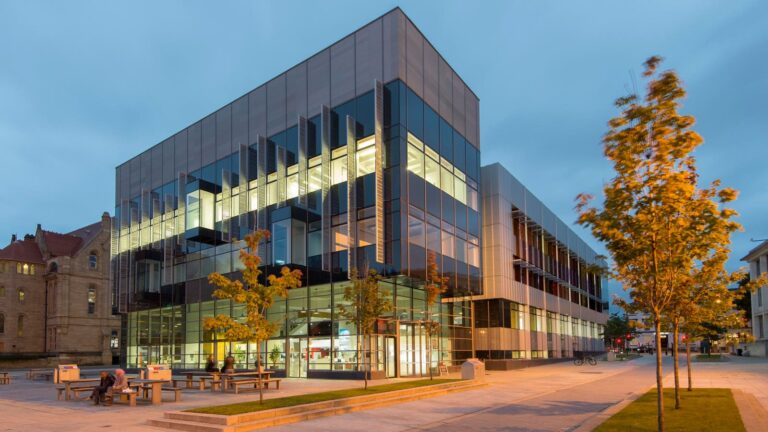Outside the Golden Triangle, only the University of Manchester … [+]
Last month, ahead of the local and mayoral elections, Manchester Digital published its Manifesto for the Northern Tech Economy, in which the organisation rightly recognised the region’s huge progress in supporting and nurturing innovators and its achievement in becoming Europe’s fastest growing tech hub outside London. It also looked at the huge untapped potential of the region, and cities beyond the Golden Triangle.
This observation, which will be all too familiar to those involved in innovation ecosystems outside the Golden Triangle, gets to the heart of why the UK is struggling to capitalise on its strengths and realise its ambitions to become the pre-eminent global tech and science powerhouse. Loss of investment and attention from innovators based in the North and Midlands could mean world firsts and breakthroughs go unrealised.
Few examples illustrate this more than the current configuration of the UK university spin-out ecosystem. Founded out of the ambition of researchers to commercialise their discoveries and innovations, these companies are among the most important drivers of scientific, technological and digital advancement, and are responsible for commercialising some of the boldest and most ambitious ideas. Yet the fourth annual survey finds that: Focus on spin-outsOutside the Golden Triangle, only one university, the University of Manchester, has made it into the top five for spin-out numbers since 2011, according to a study by the Royal Academy of Engineering and research firm Beauhurst published last month.
A government review of research commercialisation projects last year similarly found that university research commercialisation projects in the South East, London and the East of England received 74.5% of total investment in research companies in the UK in 2021/22, compared with less than 10% in the other regions combined. The overall picture for investment in start-ups and larger companies is broadly similar.
Addressing inequality
We know that outside the Golden Triangle there is no shortage of innovators, entrepreneurs, potential startups and spinouts. Rather, there is just a shortage of available investment. Investors looking for opportunities in the technology and science sectors tend to be based or disproportionately concentrated in Oxford, Cambridge and London, which are perfectly symbiotic. The reasons for busy investors are clear and understandable: why base yourself anywhere else when the biggest opportunities have historically been in the same places?
So how do we address this gap and ensure innovators across the country have access to investment and opportunity? The concrete progress we’ve made in this area is undoubtedly down to working with innovation champions from across businesses, local authorities and university leadership. Working together, we’ve been able to highlight to investors the opportunities available in the North West, Midlands and Yorkshire, as well as unlock new sources of funding within the regions themselves. One great example of how progress is already being made in this area is Northern Gritstone, the investment company that has brought together the Universities of Leeds, Manchester and Sheffield to enable innovative spin-out companies to access the funding they need to succeed. This has set a blueprint for how we can unlock wealth and support innovators within the region. It’s important to replicate that success elsewhere.
Cross-sector efforts to create dedicated clusters have been a huge success. Bruntwood SciTech, for example, is focused on curating an innovation ecosystem, bringing innovators together in tight-knit communities, innovation districts and campuses. This creates attractive prospects for investors looking for new opportunities. Such hubs give investors the opportunity to visit multiple investment destinations in one visit, a key factor for time-poor venture capitalists and portfolio managers.
We have a blueprint for success, but we need to go further. Unlocking regional capital and devolving decision-making on innovation spending is the next step towards developing a UK-wide innovation economy and will likely be a key focus of the next administration. More patient capital sources, such as local authority pension funds, need to be brought on board. Growing schemes, such as the British Business Bank’s Midland Engine Investment Fund and regionally-focused investment firms such as the aforementioned Northern Gritstone, need to be encouraged and supported. Outside the Golden Triangle, multiple new spin-out ecosystems are emerging, underpinned by university-investor partnerships. The challenge now is to build on these seeds of success.
To fully realise our ambition to become a global innovation powerhouse, we need to involve the whole country – not just a few. At the same time, improving the funding gap should not come at the expense of the Golden Triangle, which remains the jewel in the UK’s innovation ecosystem and too valuable to divert investment. This is not a matter of capital being hoarded in any particular region, but of the need to unlock new sources of funding across the country. Until then, those outside the Triangle must continue to come together to take their destiny into their own hands and create opportunities for themselves.

